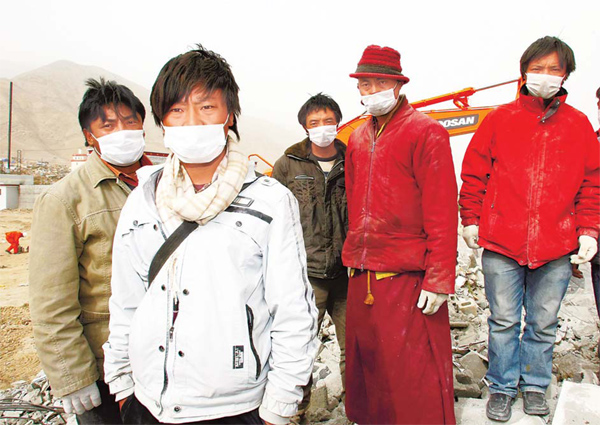Rescue & Aid
Grassroots charities, volunteers help the helpers
By Hu Yongqi (China Daily)
Updated: 2010-04-30 07:01
 |
Large Medium Small |
Grassroots charities and volunteers are vital to healing the wounds caused by the Qinghai earthquake, relief workers tell Hu Yongqi in Yushu.
|
 |
|
Gyashul Adrou (front), 24, whose orphanage collapsed when the earthquake hit Gyegu town, Qinghai province. He said he feels grateful for the help of volunteers, especially 46-year-old Wong Fuk Wing from Hong Kong who was killed while helping children escape the crumbling buildings on April 14. HUO YAN/CHINA DAILY
|
Gyashul Adrou watched quietly as the large steel claw ripped into the remains of his orphanage. Sifting through the rubble, it was not long before the excavator uncovered a handful of small red quilts squeezed in the corner of the collapsed cement wall.
The four-story building in Gyegu town crumbled to the ground when the earthquake hit Qinghai province on April 14.
Although all 22 orphans escaped unharmed or with only minor injuries, 46-year-old volunteer Wong Fuk Wing was killed while shepherding children to safety.
"Wong had already fled to a safe place after the earthquake but he ran back into the building to save three trapped kids (and three teachers)," said Gyashul Adrou, 24, who has run the orphanage since 2006 in Gyegu town of the Yushu Tibetan autonomous prefecture with his 27-year-old brother Kagyu Mulan. "Wong's body has been flown back to his native Hong Kong and I hired an excavator to see if they could find his belongings and documents."
Running a grassroots charity is not only difficult, it is also sometimes dangerous, he said. "But I believe we are doing something meaningful."
Most of the children rushed to help erect the emergency relief tents supplied by the authorities shortly after the 7.1-magnitude tremor, but some were simply in too much shock. One 9-year-old boy has not spoken a word in more than two weeks.
"The people here can't survive the disaster and start a new life without help," said the orphanage boss. "We need more support, not just from the government but also from more grassroots charities."
Guang Pu, a 30-year old philanthropist from Southeast China, has a wealth of experience in dealing with children suffering post-traumatic stress. As the head of an orphanage in Xiamen, Fujian province, she was among a team of volunteers who rushed to Sichuan shortly after the 8.1-magnitude earthquake struck in 2008.
"We had professional psychologists in our team who could help child victims to face reality and encourage them to start a new life," Guang said, whose center adopted 43 children orphaned by the disaster. "They were all easily scared. (When we were driving back to Xiamen,) two of the kids even wanted to jump out of the car because they were afraid of the vibrations caused every time the car brake in traffic. All I could do was hug them to calm them down."
Guang's orphanage, which she founded in 2006, is also a charitable foundation, and has more than 2,000 members and volunteers. She expects to adopt out 108 children whose parents were killed in the Yushu disaster. While collecting details on the youngsters, her team has also helped survivors cook meals.
Grassroots charities forge better relationships with victims and are easily accepted by local people, she said. However, volunteers often face a lack of resources and inadequate organization.
"Our biggest problem is a lack of funds," said Gyashul Adrou. It costs up 130,000 yuan ($19,000) a year to run his orphanage, where the children are 6 to 15 years old. He said the only income is from his brother's private medical clinic, which is barely enough.
"The fact is, lots of people want to donate (to charities like Gyashul Adrou's), but there is just no suitable organization to accept these donations, meaning non-governmental charitable organizations often encounter financial difficulties," said Guang.
Challenges in aid
The best way to solve this problem is transparency: organizations need to make it clear how they spend the money they receive so people can contribute with confidence, she said.
"Our foundation's financial report is published on the Internet," she said. "We reported every cost, including every pencil we buy. (Our website has) a counter that updates the status of our revenue and expenditures every 24 hours."







